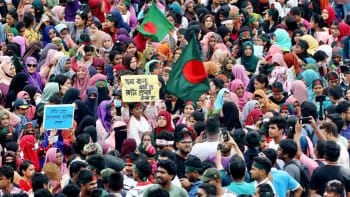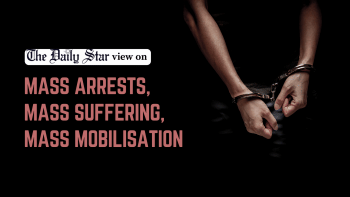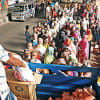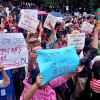Bangladesh’s growth story lacks justice and humanity

The student-led non-political quota reform movement—calling for fair treatment towards all job seekers on the basis of merit—ended up being such a huge tragedy because of a total lack of sensitivity and understanding of reality on the part of the government and the ruling political party. The ongoing student movement, which began on July 1, 2024, is the manifestation of bigger problems that policymakers have overlooked for decades. The problems are economic, social and political in nature. Behind the quota movement is the suppressed anger and deprivation in various forms that have existed for a long time.
Despite economic progress during the last one and a half decades, for which the current government takes credit, there are not enough jobs for the young population in the country. With stagnant private investment which was 23.5 percent of the gross domestic product (GDP) in fiscal year (FY) 2024, the private sector cannot create that many jobs. Meanwhile, with the increases in salaries, perks, job security and power, government jobs have become the most coveted form of employment in the market.
Though the official unemployment rate is only 3.53 percent according to the Labour Force Survey (LFS) 2022, youth unemployment stands at eight percent, according to the Bangladesh Bureau of Statistics (BBS). The percentage of youth aged 15- 24 years who are not in employment, education, and training (NEET) is 40.67 percent. In a skewed labour market, the opportunity for decent employment is limited, due to which 84.9 percent jobs are in the informal sector where income and job security are low.
Cleary, the economic growth in Bangladesh could not create enough jobs. This is also reflected in a downward trend in the employment elasticity of GDP. Employment elasticity is a measure of how employment changes due to changes in economic growth. The quarterly GDP estimates and LFS data indicate that in FY2022, employment elasticity was 0.38 percent, which has come down to 0.13 percent in the first quarter of FY2024.
The lack of employment opportunities, rampant corruption, cronyism, huge bank loan defaults, and lack of good governance have resulted in unequal distribution of economic opportunities and wealth across all strata of society. The top five percent of the population possessed 30.04 percent of the national income in 2022, which was 27.82 percent in 2016. On the other hand, the bottom five percent owned only 0.37 percent of the national income in 2022, which increased slightly from 0.23 percent in 2016. On the other hand, the average inflation rate in Bangladesh was 9.72 percent in June 2024. The failure of the government to contain high inflationary pressure during the last two years has squeezed the purchasing power of low and middle-income families.
The so-called "political stability," which has turned into a one-party system without credible national elections for a decade, has resulted in a lack of accountability in every sphere of public services. Hence, reducing inequality and empowering the people—particularly the young and the poor—through ensuring productive employment with a decent salary remained outside the development realm of the government, except for some lip service in national strategies such as the five-year plans. Bangladesh has not yet ratified the Employment Policy Convention, 1964 (No. 122) of the International Labour Organisation (ILO) on pursuing "full, productive and freely chosen employment." Among South Asian countries, India ratified the convention in 1998, and Sri Lanka did too in 2016.
An important change in governance during the past one and a half decades is evident through over-bureaucratisation and over-regulation of the economy. This has failed to provide skills and jobs to the people, leading to unabated corruption and huge resource misuse which has favoured the rich and privileged, and throttled the opportunities of the common people and the youth.
Though some government interventions helped achieve growth and improve average social indicators such as health and education, the quality and distributional issues of such advancements are questionable. Access to public facilities is unequal. Moreover, the allocation of public resources to the social sectors is very low and stagnant although both the size of the economy and the national budget have expanded over the years. Allocation for the health sector is at 0.74 percent of GDP, and only 1.67 percent of GDP is for education. Actual public expenditure for social safety net programme (SSNP) is very low at 1.32 percent of GDP in FY 2025, even though the government has inflated SSNP allocation figures by adding pensions for government employees, interests for savings certificate, and agricultural subsidy to the calculation.
On a broader perspective, Bangladesh's persistent growth model, which disregarded the rule of law on several occasions, has resulted in the establishment of entrenched rent-seeking. The culture of the distribution of public contracts, licenses, and benefits by government ministries has been practised for several years now. The distortion of economic policymaking with the objective of favouring certain groups is a clear reflection of obvious patronage and clientelism. The banking sector, the power sector, and the readymade garments sector are only a few examples where many policies and rules have been formulated to exclusively support these vested interests at the cost of national interest. For instance, policies in the banking sector are dictated by powerful people who also incidentally receive licenses because of their political connections. Due to poor governance, the sector is overburdened with wilfully defaulted bank loans, which rose consistently from Tk 22,480 crore in 2009 to Tk 156,039 crore in the fourth quarter of FY2023. Fraud and irregularities are also on the rise. An assessment of only 24 significant published irregularities that occurred between 2008 and 2023 revealed that a total of Tk 92,261 crore was taken out of the banking system, which is equivalent to 2 percent of the GDP of FY2023 and 12 percent of the national budget for FY2024.
For the less privileged, access to public services often depends on bribes to officials and connections with the ruling party's local cadres. For example, the government's beneficiary list of the SSNPs often ends up excluding the genuinely poor people and including non-needy people, as the party men control such programmes for the poor.
The cracks in the development pattern of the current government have been clearly visible for some time now. This condition has arisen due to insufficient and misguided policies, together with ineffective execution, a deficiency in governance, and a lack of reform measures. Macroeconomic stability is broken as all key indicators have been deteriorating during the last two years. Shrinking fiscal space due to low tax-GDP ratio, increased debt servicing liability, dwindling foreign exchange reserves due to low export and remittances, a fragile financial sector, low investment, and high prices of fuel and essential commodities have subdued economic growth. Institutions have been systematically weakened, while policymakers have shown less enthusiasm for improving governance, which is a prerequisite for achieving inclusive and sustained economic growth. Over the years, institutions have become extractive in nature, where the nexus among political elites, bureaucrats, and a small but privileged group exploit the rest of the population. Such a predatory state has ignored the participation and voice of the larger section of the people in economic policymaking, including empowering the youth through quality education, skills and employment.
Therefore, students have now termed their protest a movement for justice. Students' demands have touched millions across the country. The government's brutality was manifested in the heavy-handed manner in which it tackled the movement for a just cause. Display of more importance to the destruction of physical infrastructure over human lives is a cruel insensitivity to the students and common people who were killed and injured.
Alas, Bangladesh's growth story does not have a human face!
That is why the student movement has now transformed into a mass movement from where the call for political change is sought. Indeed, without a participatory political system and the establishment of people's voting rights, economic growth can neither sustain nor be just and humane.
Dr Fahmida Khatun is executive director at the Centre for Policy Dialogue (CPD) and a non-resident senior fellow at the Atlantic Council.
Views expressed in this article are the author's own.
Follow The Daily Star Opinion on Facebook for the latest opinions, commentaries and analyses by experts and professionals. To contribute your article or letter to The Daily Star Opinion, see our guideline for submission.

 For all latest news, follow The Daily Star's Google News channel.
For all latest news, follow The Daily Star's Google News channel. 











Comments